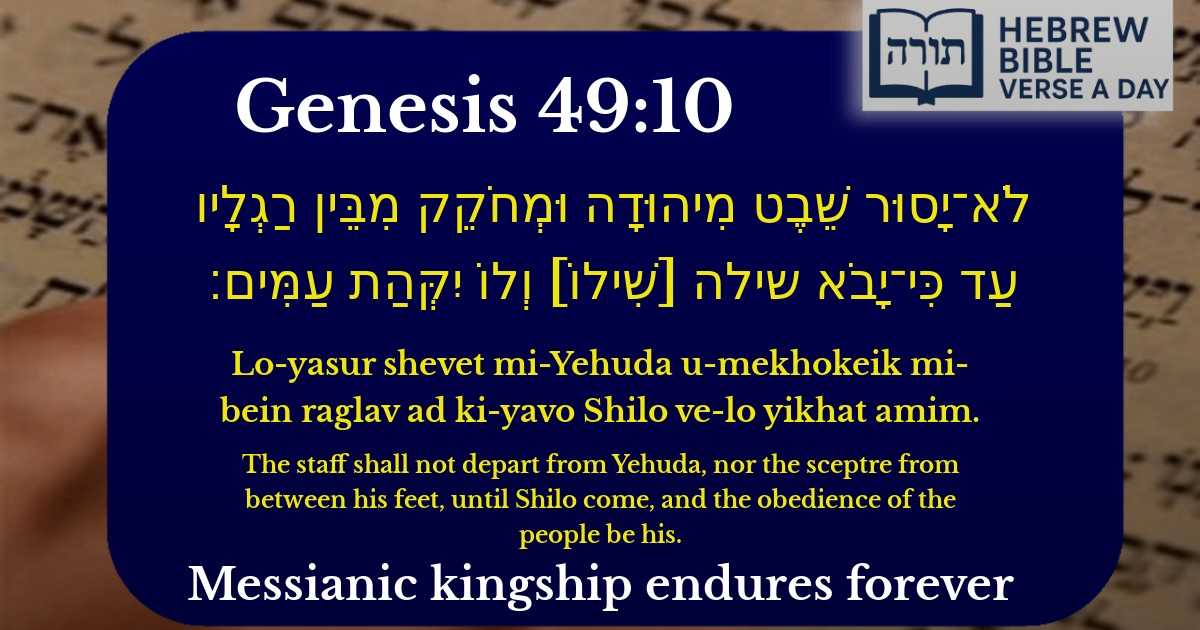Join Our Newsletter To Be Informed When New Videos Are Posted
Join the thousands of fellow Studends who rely on our videos to learn how to read the bible in Hebrew for free!
Hebrew Text
לֹא־יָסוּר שֵׁבֶט מִיהוּדָה וּמְחֹקֵק מִבֵּין רַגְלָיו עַד כִּי־יָבֹא שילה [שִׁילוֹ] וְלוֹ יִקְּהַת עַמִּים׃
English Translation
The staff shall not depart from Yehuda, nor the sceptre from between his feet, until Shilo come, and the obedience of the people be his.
Transliteration
Lo-yasur shevet mi-Yehuda u-mekhokeik mi-bein raglav ad ki-yavo Shilo ve-lo yikhat amim.
Hebrew Leining Text
לֹֽא־יָס֥וּר שֵׁ֙בֶט֙ מִֽיהוּדָ֔ה וּמְחֹקֵ֖ק מִבֵּ֣ין רַגְלָ֑יו עַ֚ד כִּֽי־יָבֹ֣א <span class="mam-kq-trivial">שִׁילֹ֔ה</span> וְל֖וֹ יִקְּהַ֥ת עַמִּֽים׃
לֹֽא־יָס֥וּר שֵׁ֙בֶט֙ מִֽיהוּדָ֔ה וּמְחֹקֵ֖ק מִבֵּ֣ין רַגְלָ֑יו עַ֚ד כִּֽי־יָבֹ֣א שִׁילֹ֔ה וְל֖וֹ יִקְּהַ֥ת עַמִּֽים׃
🎵 Listen to leining
Parasha Commentary
📚 Talmud Citations
This verse is quoted in the Talmud.
📖 Sanhedrin 98b
The verse is discussed in the context of the coming of the Messiah, with interpretations of 'Shiloh' as a reference to the Messiah.
📖 Berakhot 12b
Mentioned in a discussion about the future redemption and the role of the tribe of Judah.
📖 Megillah 11a
Referenced in a discussion about the historical continuity of Jewish leadership from Judah to the Messianic era.


Explanation of the Verse
The verse "לֹא־יָסוּר שֵׁבֶט מִיהוּדָה וּמְחֹקֵק מִבֵּין רַגְלָיו עַד כִּי־יָבֹא שִׁילוֹ וְלוֹ יִקְּהַת עַמִּים" (Bereishit 49:10) is part of Yaakov Avinu's blessings to his sons before his passing. This particular blessing is directed toward Yehuda, signifying the eternal leadership of the tribe of Yehuda in Klal Yisrael.
Key Terms and Their Meanings
Traditional Interpretations
According to Rashi, the verse means that Yehuda's descendants will always retain leadership until the coming of Moshiach, who will be from the Davidic line (descended from Yehuda). The Rambam (Hilchos Melachim 11:1) cites this verse as proof that the monarchy must remain within Yehuda's lineage.
The Midrash (Bereishit Rabbah 99:8) connects this prophecy to King David and the future redemption, emphasizing that Yehuda's leadership is everlasting. The Talmud (Sanhedrin 5a) discusses how this verse establishes Yehuda's supremacy in halachic and political matters.
Halachic and Messianic Implications
This verse is foundational in Jewish thought regarding the Davidic monarchy and the eventual coming of Moshiach. The Rambam emphasizes that any future king of Israel must be from Yehuda’s lineage, reinforcing the permanence of this blessing.
The phrase "עַד כִּי־יָבֹא שִׁילוֹ" is understood by many commentators as a reference to the Messianic era, when the ultimate ruler from Yehuda’s line will restore Israel’s sovereignty and bring universal recognition of Hashem’s kingship.